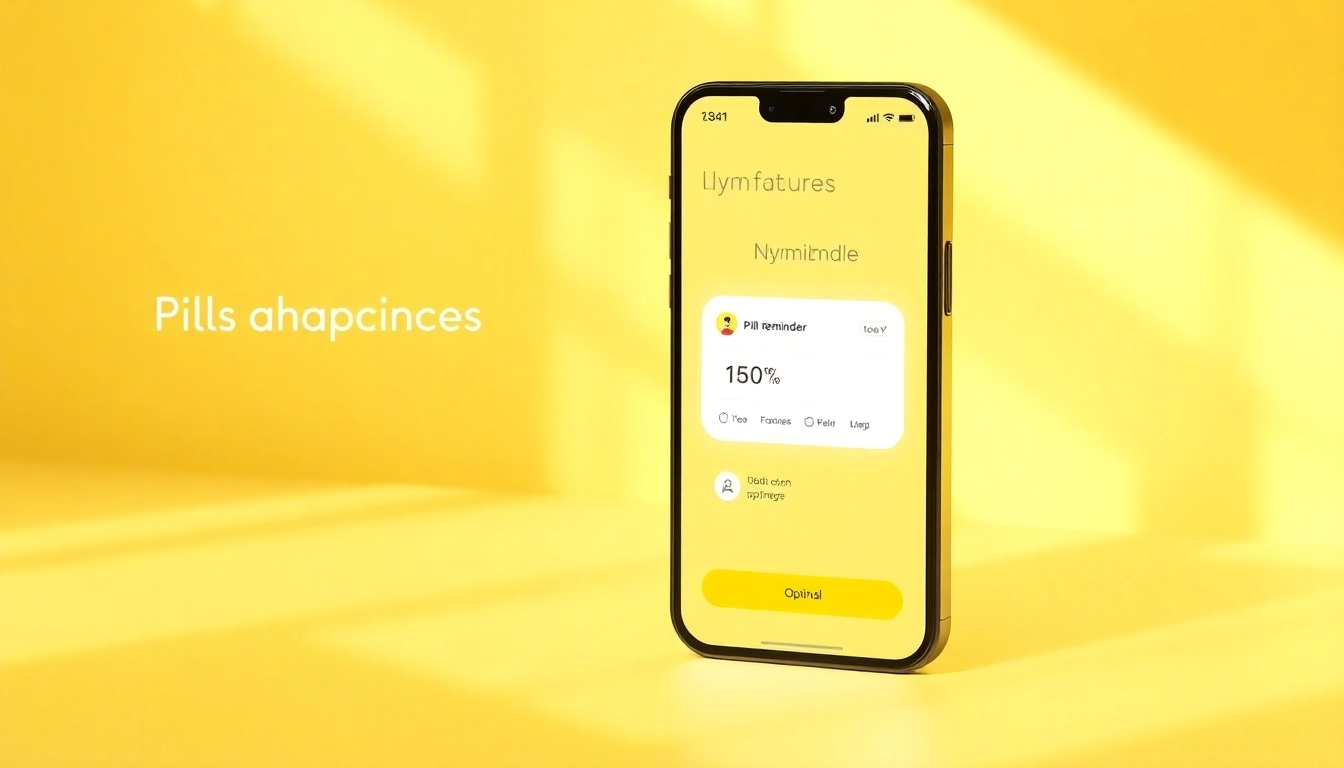Understanding the Importance of Pill Reminders
Pill reminders play a critical role in enhancing medication adherence, which is vital for effective treatment and health management. Non-adherence can lead to significant health issues, including worsening conditions and increased healthcare costs. In fact, studies have shown that nearly 50% of patients do not take their medication as prescribed, which can have dire consequences on their health. Therefore, leveraging tools such as pill reminders is essential for ensuring that patients remain consistent with their medication protocols. Utilizing a pill reminder can significantly improve adherence rates among various demographics.
What is a Pill Reminder?
A pill reminder is any device or method used to notify individuals when it is time to take their medications. This can range from traditional alarm clocks and pill organizers to sophisticated digital solutions like mobile apps. These reminders are designed to combat forgetfulness and improve adherence to medication schedules, which is particularly crucial for individuals managing chronic conditions or complex medication regimens.
Common Challenges in Medication Adherence
Despite the availability of various reminder tools, many individuals still struggle with medication adherence. Some common challenges include:
- Forgetfulness: One of the primary reasons for non-adherence is simply forgetting to take medications.
- Complex Regimens: Patients with multiple medications often find it difficult to keep track of their prescriptions.
- Side Effects: Adverse reactions to medication may discourage individuals from sticking to their regimen.
- Cost Barriers: High medication costs can lead to skipping doses, especially for individuals without insurance.
- Lack of Understanding: Patients may not fully understand the importance of their medication, leading to non-compliance.
Benefits of Using Pill Reminders
Implementing a pill reminder system can offer numerous benefits:
- Improved Adherence: Reminders ensure that doses are taken on time, thus boosting adherence rates.
- Better Health Outcomes: Consistent medication usage leads to improved health outcomes and reduced hospitalizations.
- Stress Reduction: Knowing when to take medications can alleviate the anxiety associated with managing health conditions.
- User-Friendly: Many modern pill reminder solutions are user-friendly and can be customized to meet individual needs.
Types of Pill Reminder Solutions
With advancements in technology, several types of pill reminder solutions are available to cater to diverse needs. These options range from traditional methods to cutting-edge technology.
Mobile Apps and Their Features
Mobile applications have gained immense popularity as pill reminder solutions due to their accessibility and advanced features. Here are some notable features commonly found in these apps:
- Customizable Reminders: Users can set specific times and frequencies for their medication reminders.
- Syncing Capabilities: Many apps sync with calendars or other health apps, providing comprehensive health management.
- Health Tracking: Some apps allow users to log their medication adherence and any side effects experienced.
- Family Sharing: Certain applications enable sharing of medication schedules with family or caregivers, enhancing accountability.
Popular apps like Medisafe and MyTherapy exemplify the best practices in pill reminder technologies.
Electronic Devices vs. Traditional Methods
When choosing a pill reminder system, users can opt for electronic devices or stick with traditional methods:
- Electronic Devices: These include smart pill dispensers that have built-in alarms and even apps that connect to smart home devices. They can often provide notifications based on medication schedules.
- Traditional Methods: Pill boxes with compartments for different times of the day and alarm clocks are still used by many. While they may lack the technological edge of electronic devices, they can be effective for some users.
How Pill Organizers Can Help
Pill organizers serve as a physical reminder and help users structure their medication routines effectively. Some benefits include:
- Visual Cues: Organizers provide a visible reminder of whether medication has been taken or not.
- Reduced Medication Errors: Organizers can lessen the chances of over-dosage or missing a dose, especially for patients on multi-drug regimens.
- Portability: Many organizers are compact and can be taken on the go, ensuring adherence even when traveling.
Implementing a Personal Pill Reminder System
To maximize the effectiveness of a pill reminder system, proper implementation and customized approaches are essential. Here are the key steps.
Steps to Set Up a Pill Reminder
Setting up a pill reminder can be straightforward. Follow these steps:
- List All Medications: Keep a record of all current medications, dosages, and prescribed times.
- Choose a Reminder Method: Decide if a mobile app, electronic device, or traditional method fits best with your lifestyle.
- Set Up Reminders: If using an app or device, program the times for each medication. For traditional methods, set alarms to remind you.
- Test the System: Initially, test the reminders to ensure they work as planned and adjust them if needed.
- Review Regularly: Periodically check your adherence and make adjustments to your system as your medication changes.
Tailoring Reminders to Individual Needs
Everyone’s medication routine is unique. Personalizing reminders can involve:
- Setting Realistic Frequencies: Adjust reminder frequencies based on how often doses need to be taken.
- Incorporating Visual Aids: For those who benefit from visual cues, consider color-coding medications or using labeled organizers.
- Following Up with Caregivers: Involving family members in the reminder system can enhance accountability and support.
Integration with Healthcare Providers
Collaborating with healthcare providers is crucial for effective medication management. Establishing a communication channel can help ensure:
- Regular Medication Reviews: Discussing your medication plan with your provider can help adjust reminders based on any changes.
- Addressing Side Effects: If experiencing side effects, a provider may recommend adjusting dosages or trying different medications.
- Education and Resources: Healthcare providers often provide additional resources or recommendations tailored to your situation.
Staying Motivated with Your Pill Reminder
Even with the best systems in place, staying motivated to adhere to medication can be challenging. Here are strategies to maintain motivation.
Incorporating Reminders into Daily Routines
Integrating medication reminders into daily routines can make adherence more habitual:
- Linking to Daily Activities: Take medications alongside common activities, such as brushing teeth or having meals.
- Using Visual Cues: Place medication near items that remind you to take them, like your toothbrush or coffee maker.
- Establishing a Routine: Consistency is key; designate a specific routine that includes medication taking at the same time each day.
Overcoming Barriers to Medication Adherence
It’s essential to recognize potential barriers and proactively address them:
- Setting Realistic Goals: Aim for manageable adherence goals. Perfectionism can lead to discouragement.
- Utilizing Support Networks: Engage family and friends for additional support, which can enhance commitment to your medication routine.
- Educating Yourself: Understand the necessity and benefits of your medications to reinforce your commitment to adherence.
Tracking Progress and Adjusting Reminders
Monitoring adherence is pivotal for long-term success:
- Reviewing Medication Logs: Use medication tracking apps or journals to log doses taken, noting any missed doses.
- Rewarding Progress: Consider small rewards for successfully adhering to your medication schedule for an entire week or month.
- Adjusting Reminders as Necessary: If the current system is not effective, don’t hesitate to modify the reminders or try different tools.
Advanced Features in Modern Pill Reminders
Today, many pill reminders come equipped with advanced features that further enhance their effectiveness. Utilizing these features can streamline processes and improve user experience.
Utilizing Smart Technology for Reminders
Smart technology has transformed how people manage their medications. This includes:
- Smart Pill Dispensers: Devices that dispense the correct dosage and send notifications when it’s time to take medication.
- Voice-Activated Reminders: Devices like Amazon Echo or Google Home can set reminders verbally.
- Integration with Other Health Apps: Many reminders can sync with fitness trackers and health monitoring apps for a holistic health approach.
Sharing Medication Information with Caregivers
Sharing medication schedules with caregivers is paramount for ongoing support:
- Regular Updates: Keep caregivers informed of any changes in medication or adherence status.
- Access to Medication Logs: Share your medication logs with caregivers to help them provide better support and advice.
- Direct Communication: Use apps that allow caregivers to communicate directly about adherence and any challenges faced.
Exploring Innovative Pill Reminder Apps
Innovative apps continue to emerge, making medication management easier:
- Medisafe: An excellent app that tracks medications and allows sharing with family or caregivers.
- MyTherapy: Combines medication reminders with a health diary function for holistic health tracking.
- Round Health: Simplifies the process of setting custom reminders and managing doses, ideal for complex medication regimens.



